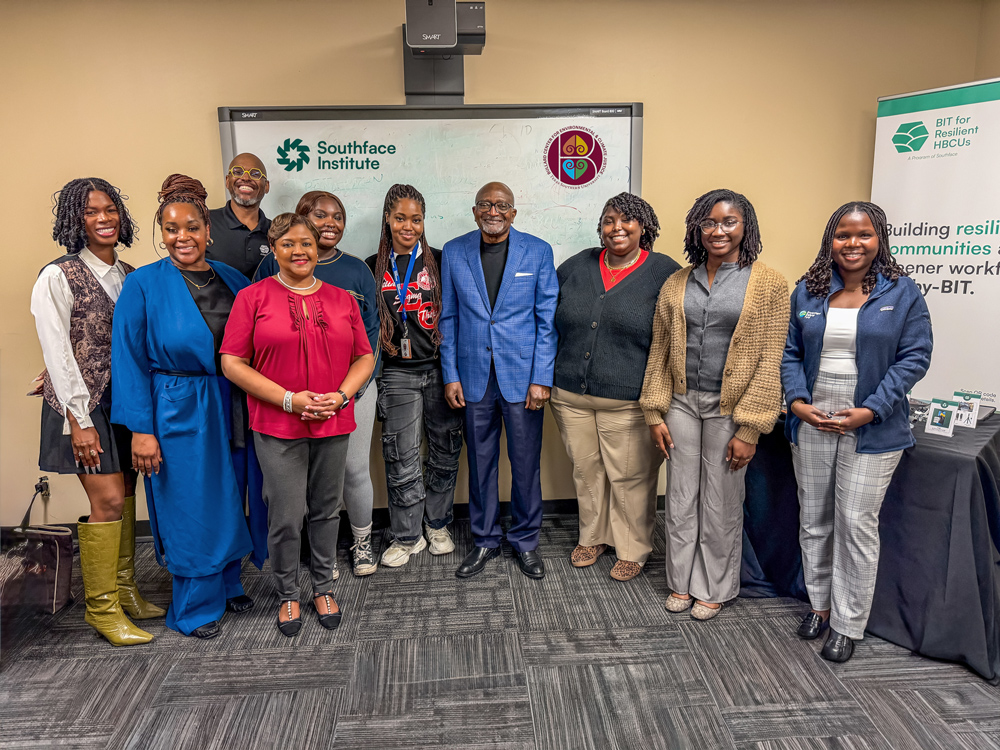Lorem ipsum dolor sit amet, consectetur adipiscing elit. Suspendisse varius enim in eros elementum tristique. Duis cursus, mi quis viverra ornare, eros dolor interdum nulla, ut commodo diam libero vitae erat. Aenean faucibus nibh et justo cursus id rutrum lorem imperdiet. Nunc ut sem vitae risus tristique posuere.
The inaugural summer enrichment program hosted by the Bullard Center for Environmental and Climate Justice at Texas Southern University kicked off on Monday, June 5, 2023.
The HBCU Environmental and Climate Justice Corps Summer Internship program provides mentorship, training, and research opportunities for undergraduate Texas Southern University students during a four-week session from June 5-30, 2023, focusing on identifying solutions to environmental and climate-related challenges facing our most vulnerable people and communities. The HBCU-based internship program is led by TSU professor Dr. Robert D. Bullard and Dr. Beverly Wright of the Deep South Center for Environmental Justice, and is part of the HBCU Climate Change Consortium, a multi-state network of more than three-dozen institutions.
“Our goal is to build a powerful EJ Climate Corps network of students who will continue the important HBCU legacy of leading the fight against injustice and finding real solutions to environmental and climate problems that disproportionately impact Black people and people of color in the United States and abroad,” says Bullard. “We launch this internship program with undergraduate interns at TSU to lift up the outsize impact this Houston-based HBCU has played in laying the foundation for EJ research, policy, legal and civic engagement work,” says Bullard, often considered the “father of environmental justice” because of his early pioneering environmental and racial justice work at TSU beginning in the late 1970s.
“This is going to be a great summer,” says Youth Program Coordinator Vonda Lackey. “The students will benefit from the educational foundation that’s grounded in science, research to action and community service during these four weeks, and we feel these experiences will enhance their career trajectory and opportunities no matter their discipline.”
The students have already completed ground truthing of textbook examples of environmental injustice by participating in a “toxic tour” of some of Houston’s most environmentally threatened neighborhoods. The tour traveled through Black and Latino neighborhoods that historically have been invisible, neighborhoods whose residents are disproportionately impacted by environmental threats in the air, water and ground, near their schools and playgrounds, including Fifth Ward/Kashmere Gardens neighborhoods plagued by illegal waste dumping and where the Union Pacific Railroad contaminate site and cancer cluster are located, Manchester located fenceline with chemical plants on the Houston Ship Channel, Pleasantville impacted by industrial encroachment and flooding, and Sunnyside neighborhood that has a long history of flooding, open ditches and drainage problems.
The tour, led by Bullard Center staff and community based organization (CBO) leaders who are partners in the HBCU Consortium Justice40 Hub initiative. Madison Malone of Fort Worth, TX, a senior at TSU, described her biggest takeaway, learning these things kind of got frustrating because I have lived in these circumstances all of my life, and I never knew it was a problem until now.”
The students returned to campus with knowledge, passion, and a burning desire to raise awareness among their peers and mobilize for environmental and climate justice. They will engage in crucial conversations, organize events, and collaborate with local organizations to initiate positive change, seeking to forge a brighter, healthier future for Houston and its residents.
Devonte Emmitt, a Fifth Ward resident and senior at TSU says, “I'm going to keep trying to finda solution to all the problems. It takes a village, it takes a team, and just knowing that people are willing to help us, it made me feel good today.”
The tour provided a real-life experience of the impact of toxic facilities in fence-line communities. This experience helped illustrate the veracity of environmental exposures and climate change concerns in Houston's underserved climate-vulnerable communities. During the internship program, students will learn the value of using various research methodologies (qualitative and quantitative) to explain the short-term and long-term impacts of toxic pollution on the health and quality of life of residents living in the Houston metropolitan area.
The TSU interns will also be introduced to Geographic Information Systems (GIS) and other environmental justice and climate-related tools and analyses, including the Council on Environmental Quality Climate and Economic Justice Screening Tool, HBCU Climate and Environmental Justice Screening Tool, EPA EJScreen, CDC Social Vulnerability Index and Environmental Justice Index. These tools will help the students gain better insights in assessing community needs and priorities and conducting community-focused research. The summer projects will be presented at the culminating event at the end of June and at the Ninth Annual HBCU Climate Change Conference to be held in New Orleans October 11-15, 2023.
The HBCU Environmental and Climate Justice Corps internship program at TSU is funded by the Macquarie Group Foundation.





